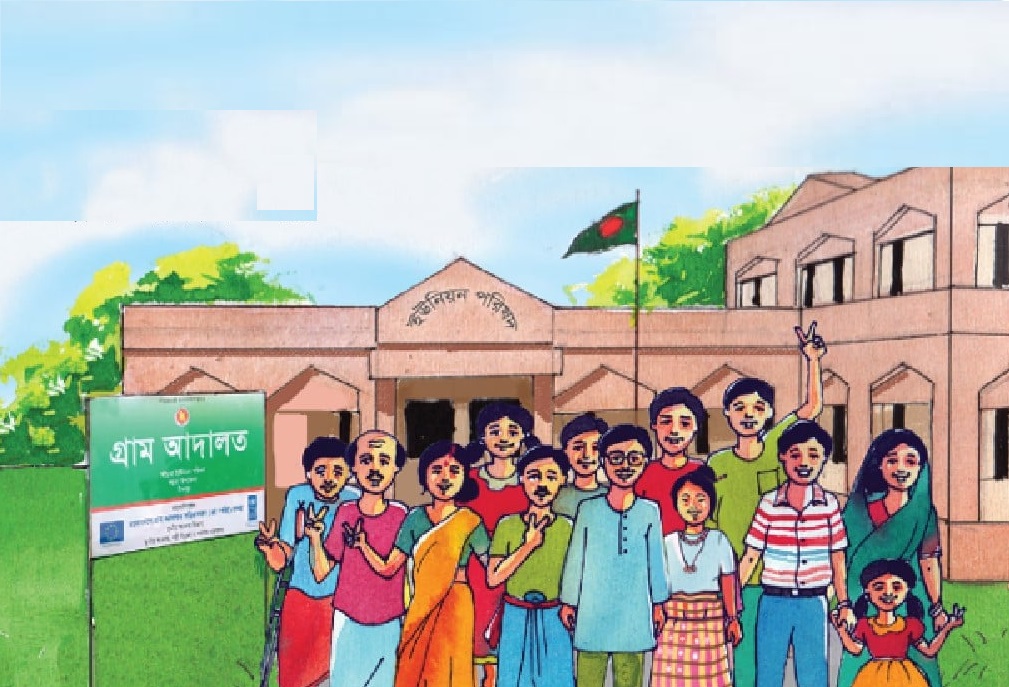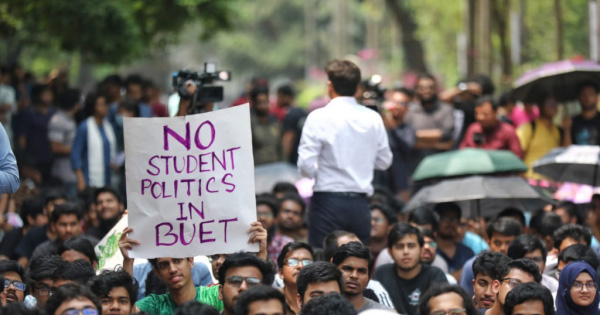Two recent incidents in Dhaka highlight the growing disregard for citizen rights and escalating social tensions under the current government. The detention of a mother and her teenage son for peacefully protesting the destruction of a public playground, and the violent clashes between students and traders in the New Market area, reveal a deeper failure of the authorities to safeguard the interests and well-being of the public.
### Case 1: Detaining Protesters – Silencing the Voice of the People
The arrest of social worker Saydea Ratna and her 17-year-old son Isa Abdullah over their protest against the construction of a police station on Tetultala playground is a glaring example of state overreach. Ratna’s crime? Live-streaming her protest on Facebook to inform the community about the ongoing destruction of one of the few public spaces available for children in Kalabagan. Instead of engaging in dialogue, the police opted to detain her and her teenage son, a blatant attempt to silence dissent.
This incident is not just about a mother and son; it’s about the government’s increasingly aggressive tactics to suppress peaceful protests and stifle voices that oppose their agenda. The fact that the police detained a minor without any specific allegations, and allegedly attempted to place him in a lockup with adults, exposes the disturbing level of indifference towards basic human rights. The authorities, rather than protecting public spaces for community use, seem more focused on cementing their control, even at the cost of local welfare.
Tetultala playground, cherished by the community as an essential space for children, is now a battleground between the local residents and a government that appears more interested in expanding its police infrastructure than listening to the people it is supposed to serve. The playground’s status as “wasteland” in official records is an appalling oversight, as the voices of local residents who have used this space for years go unheard.
### Case 2: Violence at Dhaka College – A System Out of Control
As if the blatant disregard for community rights in Kalabagan were not enough, another conflict erupted in Dhaka, this time between students and traders in the New Market area. The clashes, which led to hours of chaos, injuries, and the suspension of academic activities, reflect a systemic failure to address the underlying tensions in society. What started as a minor altercation between a few students and shopkeepers spiraled into a violent confrontation, with police forced to intervene using tear gas.
Instead of addressing the root causes of these conflicts—whether they stem from economic pressures, lack of proper dispute resolution mechanisms, or inadequate policing—the government once again resorted to reactive measures. The absence of any meaningful conflict resolution from the authorities reflects a dangerous trend: the government seems more adept at quelling unrest with force than at fostering a culture of peace and dialogue.
The immediate closure of Dhaka College following the incident only exacerbates the situation, punishing students for the failures of a system that refuses to offer safe spaces for expression and peaceful resolution of disputes. This is symptomatic of a broader issue—students, like the residents of Kalabagan, are left with little to no recourse but to engage in protest and confrontation when their needs are continually ignored.
Both incidents reflect a disturbing trend of state aggression and the erosion of public trust in institutions that are meant to serve the people. Whether it’s detaining peaceful protesters or failing to de-escalate conflicts between students and traders, the government’s actions are increasingly disconnected from the needs and voices of its citizens. In Kalabagan, the local community is being deprived of one of its few public spaces under the guise of “development.” In New Market, students are clashing with traders in a breakdown of civil order that could have been avoided with proper mediation and support. In both cases, the government has shown an alarming tendency to rely on force and intimidation rather than addressing the grievances of its people through constructive dialogue.
### The Need for Accountability and Reform
These incidents call into question the government’s commitment to democratic principles, human rights, and the well-being of its citizens. The government must immediately:
1. **Stop the Criminalization of Peaceful Protest**: The arrest of Ratna and her son is a clear example of the state suppressing legitimate dissent. This is unacceptable in a functioning democracy. The government must release them immediately and cease the construction of the police station on the playground until a proper dialogue with the community is held.
2. **Prioritize Public Spaces Over Bureaucratic Expansion**: The Tetultala playground is vital for the community, especially in a densely populated area like Kalabagan where open spaces are rare. The government must reconsider its plans and preserve the playground for the residents, especially the children.
3. **Promote Peaceful Resolution of Disputes**: The violent clashes at New Market are indicative of a deeper problem. The government must invest in conflict resolution mechanisms and ensure that such incidents do not escalate to the point where police intervention is necessary.
4. **Ensure Transparency and Accountability in Policing**: The fact that four police officers had to be withdrawn in response to their inappropriate treatment of protesting children earlier this year shows how deeply ingrained misconduct has become. The government must take serious steps to reform policing practices and hold law enforcement accountable for their actions.
### Conclusion
The government’s failure to protect public spaces, suppress peaceful protests, and address civil unrest reflects a dangerous shift away from democratic values. The people of Bangladesh deserve better—better governance, better conflict resolution, and a government that listens to their needs rather than silencing them. If the authorities continue down this path of authoritarianism, they risk alienating the very citizens they are meant to serve. It is time for the government to prioritize the people over power and to take meaningful steps toward accountability and reform.







